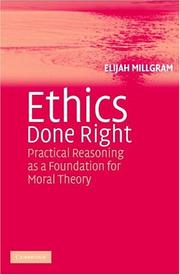| Listing 1 - 6 of 6 |
Sort by
|

ISBN: 0511130570 9780511130571 0511129041 9780511129049 1107151058 1280422262 051118249X 0511200110 0511300549 0511610610 0521548268 0521839432 9780521548267 9780521839433 9780511610615 Year: 2005 Publisher: Cambridge: Cambridge university press,
Abstract | Keywords | Export | Availability | Bookmark
 Loading...
Loading...Choose an application
- Reference Manager
- EndNote
- RefWorks (Direct export to RefWorks)
Ethics Done Right examines how practical reasoning can be put into the service of ethical and moral theory. Elijah Millgram shows that the key to thinking about ethics is to understand generally how to make decisions. The papers in this volume support a methodological approach and trace the connections between two kinds of theory in utilitarianism, in Kantian ethics, in virtue ethics, in Hume's moral philosophy, and in moral particularism. Unlike other studies of ethics, Ethics Done Right does not advocate a particular moral theory. Rather, it offers a tool that enables one to decide for oneself.
Ethics. --- Conduct of life. --- Reasoning. --- Thought and thinking. --- Mind --- Thinking --- Thoughts --- Educational psychology --- Philosophy --- Psychology --- Intellect --- Logic --- Perception --- Psycholinguistics --- Self --- Argumentation --- Ratiocination --- Reason --- Thought and thinking --- Judgment (Logic) --- Ethics, Practical --- Morals --- Personal conduct --- Ethics --- Philosophical counseling --- Deontology --- Ethics, Primitive --- Ethology --- Moral philosophy --- Morality --- Philosophy, Moral --- Science, Moral --- Values --- Practical reason. --- Practical rationality --- Practical reasoning --- Rationality, Practical --- Reasoning, Practical --- Arts and Humanities --- Conduct of life --- Practical reason --- Utilitarianism --- Political philosophy. Social philosophy --- General ethics
Book
ISBN: 9780190904272 9780199326020 0199326029 0190904275 9780199326037 0199326037 Year: 2021 Publisher: New York (N.Y.): Oxford university press,
Abstract | Keywords | Export | Availability | Bookmark
 Loading...
Loading...Choose an application
- Reference Manager
- EndNote
- RefWorks (Direct export to RefWorks)
Human beings have always been specialists, but over the past two centuries division of labor has become deeper, ubiquitous, and much more fluid. The form it now takes brings in its wake a series of problems that are simultaneously philosophical and practical, having to do with coordinating the activities of experts in different disciplines who do not understand one another. Because these problems are unrecognized, and because we do not have solutions for them, we are on the verge of an age in which decisions that depend on understanding more than one discipline at a time whill be made badly. Since so many decisions do require multidisciplinary knowledge, these philosophical problems are urgent. Some of the puzzles that have traditionally been on philosophers' agendas have to do with intellectual devices developed to handle less extreme forms of specialization. Two of these, necessity and the practical "ought," are given extended treatment in Elijah Millgram's The Great Endarkenment. Millgram pays special attention to the ways in which a focus on cognitive function reframes familiar debates in metaethics and metaphysics. Consequences of hyperspecialization for the theory of practical rationality, for our conception of agency, and for ethics are laid out and discussed. An afterword considers whether and how philosophers can contribute to solving the very pressing problems created by contemporary division of labor. -- from dust jacket.
Philosophy, Modern --- Specialism (Philosophy) --- Analysis (Philosophy) --- Methodology. --- Methodology --- Philosophy --- anno 2000-2099 --- Analys (filosofi). --- Analysis (Philosophy). --- Arbetsdelning (specialisering). --- Filosofi --- Philosophie analytique. --- Philosophie --- Philosophie. --- Specialism (Philosophy). --- Specialization. --- Spezialisierung. --- Spécialisation. --- Historia. --- Méthodologie --- 2000-2099. --- 2000-talet. --- Philosophy, Modern - 21st century - Methodology
Book
ISBN: 9783897852235 Year: 2010 Publisher: Paderborn Mentis
Abstract | Keywords | Export | Availability | Bookmark
 Loading...
Loading...Choose an application
- Reference Manager
- EndNote
- RefWorks (Direct export to RefWorks)
Book
ISBN: 9780190873240 Year: 2019 Publisher: New York, N.Y. Oxford University Press
Abstract | Keywords | Export | Availability | Bookmark
 Loading...
Loading...Choose an application
- Reference Manager
- EndNote
- RefWorks (Direct export to RefWorks)
Book
ISBN: 9780197669303 9780197669327 Year: 2023 Publisher: New York, N.Y. Oxford University Press
Abstract | Keywords | Export | Availability | Bookmark
 Loading...
Loading...Choose an application
- Reference Manager
- EndNote
- RefWorks (Direct export to RefWorks)
Digital

ISBN: 9783110804294 9783110159103 Year: 2011 Publisher: Berlin ;; Boston De Gruyter
Abstract | Keywords | Export | Availability | Bookmark
 Loading...
Loading...Choose an application
- Reference Manager
- EndNote
- RefWorks (Direct export to RefWorks)
| Listing 1 - 6 of 6 |
Sort by
|

 Search
Search Feedback
Feedback About UniCat
About UniCat  Help
Help News
News